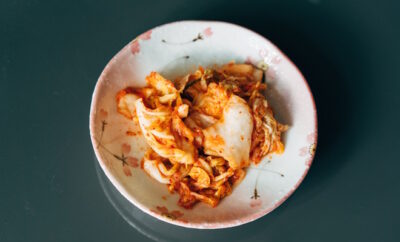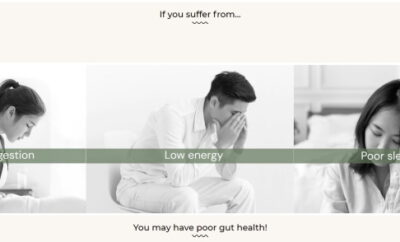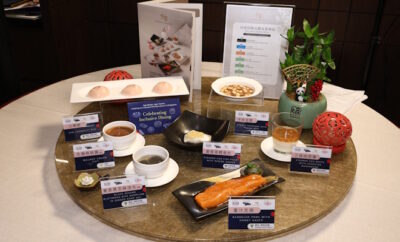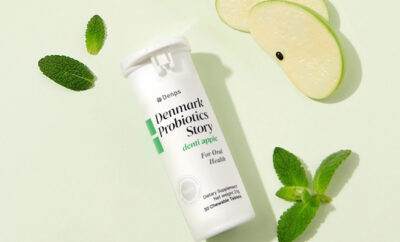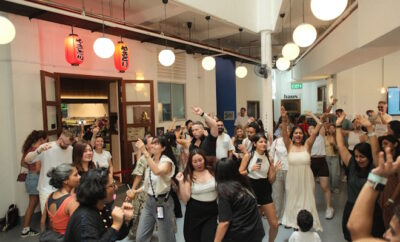
Health x Wellness
Maintaining Gut Health through Probiotics
We rely on a host of micro-organisms to keep good gut health and maintain our systems well. One of the more common micro-organisms are probiotics, usually billed as the “good” bacteria that you want more of, and working for you in the right internal systems.
Studies have shown that probiotics – when taken in the right amounts – can help with digestion, aid with protein and nutrient absorption as well as contribute to a lower pH level in the colon, to help move stools along quicker.
Other studies have shared interesting statistics such as more than 40 diseases being linked to poor gut health and even more surprising, 60 – 80% of our immune system is located in the gut. It sure looks like getting some help from probiotics to keep gut health optimal is an ideal step.
The Active Age spoke with two personalities – Belinda Lee, an actress as well as Bibi Chia, Principal Dietitian at Raffles Medical Group’s Diabetes and Endocrine Centre – to talk about selecting probiotic sources, and on maintaining gut health.

The Active Age (AA): How can poor gut health affect our daily lives?
Bibi Chia (BC): Poor gut health can manifest in symptoms like constipation, bloated stomach, diarrhoea, indigestion and abdominal pain. Although they may occur at different times and at different severity, the discomfort and inconveniences of these symptoms can adversely affect sense of wellbeing.
AA: How important is good gut health?
BC: Good gut health is important for our overall wellbeing which includes immunity and digestion of the food we eat. A huge proportion of our immune system is in our gastrointestinal tract. Hence, having good gut health also improves our immunity.
AA: What are natural sources of prebiotics and probiotics?
BC: Prebiotic is essentially dietary fibre and they are found in all grains, fruits, vegetables, beans and lentils. Some food might have more prebiotics such as leek, asparagus, chicory, Jerusalem artichoke, garlic, artichoke, onion, wheat, banana and oat, as well as soybean. On the other hand, probiotic can be found in yoghurt, yoghurt drinks, kefir, kimchi, fermented soy bean foods.
AA: Are all fermented foods (e.g. kimchi) beneficial for our gut? Is taking these natural sources sufficient?
BC: We ferment food for various reasons. It might be for preservation, alteration of taste and texture or for health benefits. Fermentation of food can also help to make some nutrients more bioavailable to our bodies. An example of which is iron.
However, not all fermented food contain good bacteria as they can be destroyed by heat through common food preparation processes such as pasteurisation or cooking. Furthermore, not all fermentation is done by bacteria. Alcoholic beverages such as beer and wine are mostly fermented using yeast.
Food fermented by lactic acid bacteria (LAB) such as milk and vegetables are common sources of good bacteria. However, some of these foods go through pasteurisation which destroys both the bad and good bacteria.
Incorporating LAB fermented food into one’s diet is beneficial for gut health. However, around 90% of LAB do not travel to where it is needed because of the acidic digestive system passage. Those with health conditions such as hypertension and diabetes may also want to watch the amount of sodium or sugar in these foods. Choosing the right probiotics supplement is critical.
AA: What is the best time to consume probiotics? Is it necessary to consume both prebiotics and probiotics together to improve gut health?
BC: There is no recommended time to take probiotic food. However, I take probiotics supplements at night so that it remains in the gut the longest.
Probiotics is best taken with a prebiotic as it is the food for the good bacteria. Most good probiotic supplements are also packaged with the necessary prebiotics.
AA: What are the things to look for when choosing probiotic supplements in the pharmacy?
BC: 100 million colony-forming unit (Cfu) to 10+ billion Cfu dosages have been well researched to show efficacy. We should always look for a product that has been examined by clinical studies and has been proven to provide health benefits.
Without the microencapsulation technology, most of the probiotics would not survive gastric acid and bile salt in the gut. Choosing a probiotics supplement that has a good coating technology such as one with dual coating is important.
Multi-strains are also preferred. This is because some, although limited, studies have shown increased efficacy with multi-strains.
Apart from efficacy, I strongly recommend ease of storage. Supplement has to be convenient and easy to consumer. For those who are constantly on the move, sachets and individually-packaged capsules are perhaps better alternatives than a clumsy tub.

The Active Age (AA): On a scale of 1 to 10, how busy is your typical day?
Belinda Lee (BL): It really depends on how much energy and how ambitious I am on a typical day. There are days when I’m really pumped to seize the day while there are also times when I would prefer to do nothing. I typically spend my hours preparing and memorising scripts, attending personal and business meetings, and brainstorming ideas with like-minded people, sharing dreams and visions and encouraging each other. I also make an effort to sign up and attend seminars for my personal and professional growth.
AA: What are the first and last things you do every day?
BL: Upon waking up, I start the day by taking DUOLAC Care probiotics. Before bed, I take my probiotics again but with calcium magnesium supplement for a quality sleep and better digestion.
AA: You travel quite a fair bit for work and your social cause. What do you fear the most when travelling?
BL: One of my biggest fears is stomach-ache or diarrhoea when travelling. It is especially depressing for someone like me who loves to eat. Food plays a large part of the culture so when I don’t get to enjoy the food during my travels, it doesn’t feel as exciting and the experience would not be complete.
AA: What is your experience of consuming DUOLAC?
BL: Since taking DUOLAC Care, I no longer have digestive issues. Prior to this, I had difficulties digesting food and consequentially, my tummy was always bloated and uncomfortable. I also noticed my complexion has improved. More importantly, I feel protected and lighter on a whole.
AA: Why did you decide to be the ambassador or face for DUOLAC?
BL: I’ve been an advocate of quality probiotics since I was in my 20s. Therefore, when DUOLAC came to Singapore, it made perfect sense for me to work with them. My role as the ambassador for the number one probiotics supplement brand in Korea further reinforces my belief that probiotics are essential in our lives. DUOLAC has given me an opportunity to promote good gut health.
AA: What is your secret for maintaining such a vibrant presence and youthful appearance?
BL: I don’t have any mind-blowing secret, but I know working out is one of the best ways to feel and look better. Getting the right nutrition from a balanced diet and the right supplements also matter. For me, probiotics is a must. I can’t emphasise more on the importance of a problem-free gut.
In addition to the physical aspects, I believe our mental, emotional and spiritual health also need to be given enough attention and taken care of. Dreaming, giving and sharing are some of the things I do to stay hopeful, purposeful and beautiful!
AA: What is your tip for happiness?
BL: It’s simple. No health, no wealth. Staying healthy is of utmost importance and everything else is secondary. A healthy body and mind allows us to fully appreciate what we have and to readily pursue greater happiness.
Images provided by DUOLAC


